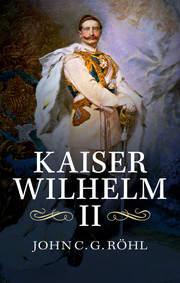Book contents
- Frontmatter
- Dedication
- Contents
- List of figures
- Acknowledgements
- Preface to the English edition
- Preface to the German edition
- Acknowledgements
- Overview: Wilhelm the Last, a German trauma
- Part I 1859–1888: The Tormented Prussian Prince
- Part II 1888–1909: The Anachronistic Autocrat
- 6 Divine right without end
- 7 Bismarck’s fall from power (1889–1890)
- 8 The establishment of the Kaiser’s personal monarchy (1890–1897)
- 9 The Chancellor as courtier: the corrupt Bülow system (1897–1909)
- Part III 1896–1908: The Egregious Expansionist
- Part IV 1906–1909: The Scandal-Ridden Sovereign
- Part V 1908–1914: The Bellicose Supreme War Lord
- Part VI 1914–1918: The Champion of God’s Germanic Cause
- Part VII 1918–1941: The Vengeful Exile
- Notes
- Index
7 - Bismarck’s fall from power (1889–1890)
Published online by Cambridge University Press: 05 September 2014
- Frontmatter
- Dedication
- Contents
- List of figures
- Acknowledgements
- Preface to the English edition
- Preface to the German edition
- Acknowledgements
- Overview: Wilhelm the Last, a German trauma
- Part I 1859–1888: The Tormented Prussian Prince
- Part II 1888–1909: The Anachronistic Autocrat
- 6 Divine right without end
- 7 Bismarck’s fall from power (1889–1890)
- 8 The establishment of the Kaiser’s personal monarchy (1890–1897)
- 9 The Chancellor as courtier: the corrupt Bülow system (1897–1909)
- Part III 1896–1908: The Egregious Expansionist
- Part IV 1906–1909: The Scandal-Ridden Sovereign
- Part V 1908–1914: The Bellicose Supreme War Lord
- Part VI 1914–1918: The Champion of God’s Germanic Cause
- Part VII 1918–1941: The Vengeful Exile
- Notes
- Index
Summary
The warning signals had begun before Wilhelm’s accession. A break had already occurred between the headstrong young Prince of Prussia and the Reich Chancellor in November 1887, when Wilhelm took part in a meeting at Waldersee’s house in support of the Berlin City Mission led by the ‘Christian-Socialist’ (in other words, anti-Semitic) court preacher Adolf Stoecker. Bismarck felt obliged to reprimand him for thus identifying himself, in a manner particularly inappropriate for an heir to the imperial German throne, with the reactionary ultra-Prussian Kreuzzeitung faction. At the same time, Wilhelm sent the Chancellor a decree addressed to ‘the Princes of the German Reich’, which he had drafted and which he intended to issue to each of his monarchical ‘colleagues’ at his accession, so that ‘the old uncles’ would obey him: the Kaiser by divine right. ‘And jump to it they must!’ Wilhelm declared in the brash jargon of the Guards lieutenant to which he had become accustomed in Potsdam, and which he used throughout his life. Appalled, Bismarck urged him to burn this toxic document at once.
Even worse than this threat to the federalist basis of Bismarck’s Reich was the undermining of the Chancellor’s peaceful foreign policy. Since the autumn of 1887 Prince Wilhelm had become a supporter of the pro-war party that had formed around the deputy chief of the General Staff, Count Alfred von Waldersee, and had pressed for an immediate strike against France and Russia. On 17 December 1887 he went so far as to attend a ‘war council’ of the generals around the old Kaiser, which expressed itself in favour of a war of aggression. The Reich Chancellor complained angrily in May 1888: ‘That young man wants war with Russia, and would like to draw his sword straight away if he could. I am not going along with that.’ Four weeks before Wilhelm II’s accession Bismarck exclaimed: ‘Alas, my poor grandchildren.’
- Type
- Chapter
- Information
- Kaiser Wilhelm IIA Concise Life, pp. 44 - 52Publisher: Cambridge University PressPrint publication year: 2014



